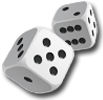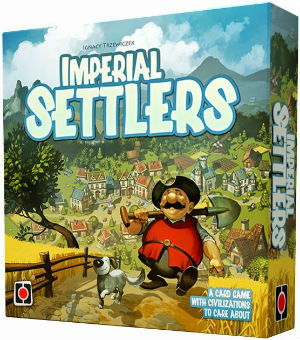



play board games
Board game reviews, strategy tips & session reports
Imperial Settlers Board Game Review
 Stats:
Stats:
No. of players: 1-4
Amount of time to play: 45-90 min
Age requirements: 10+
Set-up time: 5 min
Imperial Settlers is an empire-building card game with four unique-playing civilizations. You have five rounds to score more victory points than your opponents.
Imperial Settlers Rules Description:
Imperial Settlers is a re-implementation of 51st State and The New Era. In its new form the theme has been changed, some rules have been streamlined and each civilization has its own faction deck. There is also a common deck that all players draw cards from.
The five rounds of the game are divided into four phase, Lookout, Production, Action and Cleanup.
In the Lookout Phase you take a card from your faction deck. Then the current first player flips cards from the common deck equal to the number of players plus one. In player order each player takes one card and the remaining card is discarded. You repeat this process a second time, but in reverse player order.
Each civilization produces different goods. You may also build production buildings or use faction cards to make deals. You gain all the goods from your faction board, production buildings and deals in the production phase.
Next beginning with the starting player each player may take an action. Actions include building a location, making a deal, razing a card, activating an action location or spending workers to gain resources.
You build cards from your hand and must spend the required resources. Faction locations usually require you to discard another location you have in play in order to construct them.
Faction cards may be used to make a deal. It costs one food resource to make a deal and that deal will give its picture deal when placed and every following round.
Raze tokens are small swords. You may spend one raze token to raze a card from your hand. The card and raze token are discarded but you gain the resources shown. You may also spend two raze tokens to destroy an opponent’s common location. If your location is razed by an opponent you flip it over and gain one wood from the supply. In the future when building a faction location you may discard the flipped card to meet the faction building requirements.
As you build action locations you may spend workers and resources to activate their abilities. Some of these locations get you more resources, cards or tokens and others gain you VPs. Most action locations may only be used once per turn. You place the spent workers and/or resources on the card so you know how many times it has been activated.
You may also exchange two workers to gain a food, wood, stone or to draw a card. You may do this repeatedly in one action.
If you do not want to take an action on your turn you may pass. Once you pass you may not take any more actions this round and your buildings may not be razed.
After all players have passed, you cleanup. Any workers or resources on action locations or your faction board are returned to the supply. Each civilization has one type of resource they may store on their board but the rest are discarded. You do not discard your cards. Pass the first player token clockwise and advance the round marker on the scoring track. After the fifth and final round you don’t resolve the Cleanup phase. Just add your VPs for your locations and the player with the most VPs wins.
A Quick Review of Imperial Settlers:
Imperial Settlers is a fun card game that is easier to learn than 51st State and The New Era. But it still has its edge and new players should be ready for some direct conflict.
The components for this game are really great. The art looks nice, the cards are durable and the resource tokens are very nice. The rules are easy to read and follow and everything is put together very well.
I like how the cards can be used for multiple things. This is especially true of your faction cards. This helps you avoid getting useless cards. The Lookout phase also gives you some choice so you are not just randomly drawing from the top of the deck.
The factions all play uniquely and excel at different things. Each one is fun and you’ll want to try each one and see which fits your play style.
I like that you can store one type of good on your faction board. The faction deck, goods produced and goods stored further accentuates the differences between the factions. It also is nice you can hold onto something between the rounds so you aren’t starting from ground zero every turn.
A couple things to be aware of first there can be some downtime if you pass early in a round. It is usually not too bad but that might depend on the speed of your group.
Also even though the Lookout phase helps with the common cards, if a player draws some of their powerful faction cards early they can run out to an early lead. This is not insurmountable but might take players ganging up on the leader to slow them down.
The factions do help make the game easier to learn but I am not sure they are balanced. The Egyptians seem pretty powerful and though they are not a lock to win. It seems they have a bit of an advantage.
Lastly, it is cool the Japanese play differently but they force you to give everyone more rules when they are played with new players. In general you need to pay attention to your opponents in Imperial Settlers. And with lots of cards being added to the board it can be a lot to keep up with.
If you are looking for a fun card game with resource management and some take that, you should pick up Imperial Settlers. Just be aware of the things I mentioned above and how your game group will react to them. I think most groups will enjoy this game.
Score and synopsis: (Click here for an explanation of these review categories.)
Strategy 4 out of 6
Luck 5 out of 6
Player Interaction 5 out of 6
Replay Value 4 out of 6
Complexity 4 out of 6
Fun 5 out of 6
Overall 5 out of 6

Leave a Reply